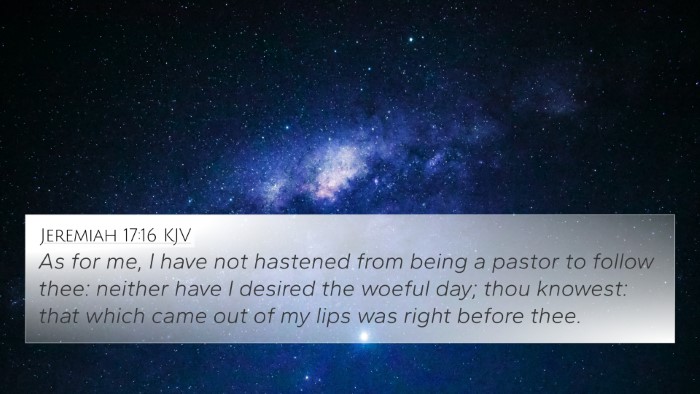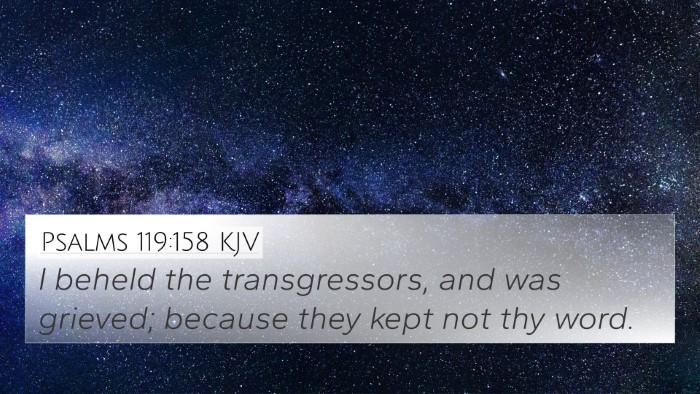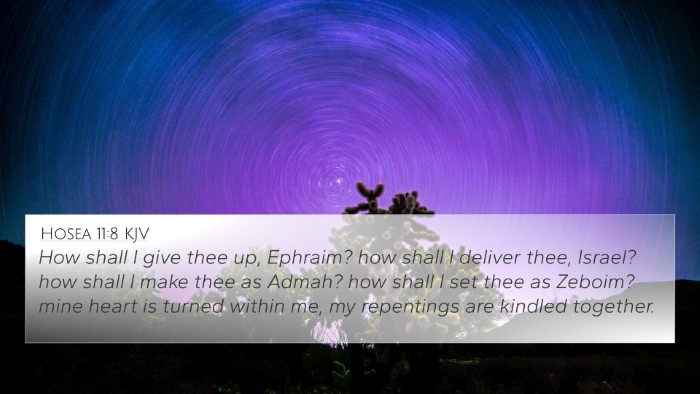Understanding Luke 19:41
Luke 19:41 states, “And when he was come near, he beheld the city, and wept over it.” This poignant moment reveals the profound emotional response of Jesus as he approaches Jerusalem, highlighting themes of compassion, sorrow, and the importance of repentance.
Contextual Background
In this passage, Jesus is nearing the culmination of his earthly ministry and is approaching Jerusalem for the final time. Notably, this event occurs shortly before his crucifixion, which imbues the moment with a heightened sense of urgency and significance. The city's impending doom is a central point of Jesus' lamentation.
Commentary Insights
-
Matthew Henry's Commentary:
Henry emphasizes that Jesus' tears symbolize genuine care for the lost state of the people of Jerusalem. The act of weeping indicates his deep sorrow over their stubbornness and ultimate rejection of God's salvation.
-
Albert Barnes' Notes:
Barnes points out that Jesus foresaw the destruction of Jerusalem due to the people's failure to recognize their Messiah. This foresight signals both his compassion and a serious warning regarding the consequences of disbelief.
-
Adam Clarke's Commentary:
Clarke highlights the prophetic nature of Jesus’ tears. He presents this moment as a fulfillment of Old Testament prophecies regarding Jerusalem's fate, linking Jesus’ lament with God's enduring message of love and justice.
Thematic Connections
The themes present in Luke 19:41 can be compared with various other Biblical texts that express similar sentiments of grief, love, and prophetic warnings:
- Matthew 23:37-39: Jesus laments over Jerusalem, showcasing a recurring theme of sorrow for the lost. "O Jerusalem, Jerusalem, thou that killest the prophets, and stonest them which are sent unto thee..."
- Jeremiah 9:1: The prophet Jeremiah expresses sorrow for his people during a time of impending judgment - "Oh that my head were waters, and mine eyes a fountain of tears." This connects Jesus' grief with the feelings of the Old Testament prophets.
- Luke 13:34: Another instance where Jesus expresses his desire to gather his people, underscoring his longing for their repentance and safety.
- John 11:35: "Jesus wept." This shortest verse conveys the profound emotional weight of Jesus' experiences, reflecting his empathy and compassion.
- Romans 9:2-3: Paul speaks of his great sorrow for the Israelites, resonating with the same emotional depth found in Jesus' lament.
- Zechariah 12:10: A prophetic preview of the lamentation for Jesus; "they shall look upon me whom they have pierced, and they shall mourn for him..."
- Isaiah 53:3: Foretelling the suffering and rejection of the Messiah, relating to the sorrow that Jesus demonstrated.
Cross-Referencing Biblical Texts
Luke 19:41 provides a rich opportunity for cross-referencing Biblical texts to uncover deeper meanings and connections:
- Connections between Bible verses: Understanding how Jesus' heartache over Jerusalem aligns with the thematic messages of the prophetic books.
- Bible concordance tools: Utilize concordance bindings to find similar motifs of sorrow and compassion across the scripture.
- Comparative Bible verse analysis: Analyzing how different authors depict themes of neglect and warning through their historical contexts.
- Inter-Biblical dialogue: Engaging with discussions around the continuity of God's message throughout scripture, emphasizing his desire for restoration and repentance.
Application and Reflection
Understanding Luke 19:41 encourages believers to reflect on their own relationship with God:
- Consider the compassion Jesus shows, and apply that in personal relationships.
- Reflect on the importance of recognizing and responding to God's call for repentance.
- Encourage a community attitude that mirrors Jesus' desire for all to come to salvation.
Conclusion
Luke 19:41 serves as a profound reminder of Jesus' love and longing for Jerusalem and all who are lost. By exploring the interconnectedness of scripture, believers are equipped to understand the heart of God more fully, drawing lessons on compassion and the importance of repentance.












